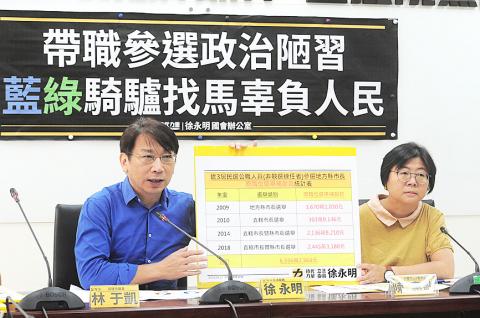The New Power Party (NPP) yesterday said that it would propose changes to the election laws that would require holders of public office to step down when running for other positions and to return the subsidy for the previous election if they do not resign by a certain date.
Draft amendments, if passed quickly, would require Kaohsiung Mayor Han Kuo-yu (韓國瑜), who has won the Chinese Nationalist Party (KMT) presidential primary, to step down as mayor and possibly to return an election subsidy of about NT$26 million (US$836,685) that he received after being elected.
Under the proposed amendments to the Civil Servants Election and Recall Act (公職人員選舉罷免法) and the Presidential and Vice Presidential Election and Recall Act (總統副總統選舉罷免法), holders of public office would need to relinquish their position starting the day they register to run for another position, NPP caucus whip Hsu Yung-ming (徐永明) said.

Photo: Wang Yi-sung, Taipei Times
Those failing to step down would need to return within 30 days the election subsidy of NT$30 per vote that they received after their original victory, he said, adding that the changes would apply to the president, vice president, city mayors, county commissioners, local councilors and legislators running for another position.
Current regulations on the election subsidy have turned elections into “a profitable business” for politicians, he said.
By running for president less than a year after being elected mayor, Han is expected to receive NT$200 million in subsidies for the two elections, Hsu said.
“Even if he loses the election, he can still stay at his original position and keep the initial subsidy,” he said.
The issue has gained public attention because of Han, but it is a common phenomenon, he said, adding that in the mayoral and commissioner elections of the past 10 years, 45 public officials ran for other positions without stepping down.
Of the 45, 20 were members of the KMT, 18 were from the Democratic Progressive Party and seven ran as independents, Hsu added.
They received NT$65 million in subsidies for their initial election campaigns, he said, citing Central Election Commission statistics.
“We hope to highlight the value of public officials resigning before they register to run for another position and encourage political parties to change the way that they select their candidates,” he said.
The NPP would never nominate someone who intended to keep their office while running for another position, he added.
Han had said that he would only deal with election affairs on the weekend, but to attend a news conference at the KMT headquarters on Monday, he had canceled a visit to a Rukai festival in Kaohsiung, NPP Kaohsiung City Councilor Lin Yu-kai (林于凱) said.
Han’s campaigning could make him unavailable to handle city affairs, he said, adding that polls show that 60 percent of Kaohsiung residents want Han to resign.
The NPP would propose the bill in September when the next legislative session begins, NPP Kaohsiung chapter head Chen Hui-min (陳惠敏) said.
The bill could be passed by mid-October, before candidates need to register for the presidential election in January next year, she added.

US President Donald Trump yesterday announced sweeping "reciprocal tariffs" on US trading partners, including a 32 percent tax on goods from Taiwan that is set to take effect on Wednesday. At a Rose Garden event, Trump declared a 10 percent baseline tax on imports from all countries, with the White House saying it would take effect on Saturday. Countries with larger trade surpluses with the US would face higher duties beginning on Wednesday, including Taiwan (32 percent), China (34 percent), Japan (24 percent), South Korea (25 percent), Vietnam (46 percent) and Thailand (36 percent). Canada and Mexico, the two largest US trading

China's military today said it began joint army, navy and rocket force exercises around Taiwan to "serve as a stern warning and powerful deterrent against Taiwanese independence," calling President William Lai (賴清德) a "parasite." The exercises come after Lai called Beijing a "foreign hostile force" last month. More than 10 Chinese military ships approached close to Taiwan's 24 nautical mile (44.4km) contiguous zone this morning and Taiwan sent its own warships to respond, two senior Taiwanese officials said. Taiwan has not yet detected any live fire by the Chinese military so far, one of the officials said. The drills took place after US Secretary

CHIP EXCEPTION: An official said that an exception for Taiwanese semiconductors would have a limited effect, as most are packaged in third nations before being sold The Executive Yuan yesterday decried US President Donald Trump’s 32 percent tariff on Taiwanese goods announced hours earlier as “unfair,” saying it would lodge a representation with Washington. The Cabinet in a statement described the pledged US tariffs, expected to take effect on Wednesday next week, as “deeply unreasonable” and “highly regrettable.” Cabinet spokeswoman Michelle Lee (李慧芝) said that the government would “lodge a solemn representation” with the US Trade Representative and continue negotiating with Washington to “ensure the interests of our nation and industries.” Trump at a news conference in Washington on Wednesday announced a 10 percent baseline tariff on most goods

THUGGISH BEHAVIOR: Encouraging people to report independence supporters is another intimidation tactic that threatens cross-strait peace, the state department said China setting up an online system for reporting “Taiwanese independence” advocates is an “irresponsible and reprehensible” act, a US government spokesperson said on Friday. “China’s call for private individuals to report on alleged ‘persecution or suppression’ by supposed ‘Taiwan independence henchmen and accomplices’ is irresponsible and reprehensible,” an unnamed US Department of State spokesperson told the Central News Agency in an e-mail. The move is part of Beijing’s “intimidation campaign” against Taiwan and its supporters, and is “threatening free speech around the world, destabilizing the Indo-Pacific region, and deliberately eroding the cross-strait status quo,” the spokesperson said. The Chinese Communist Party’s “threats